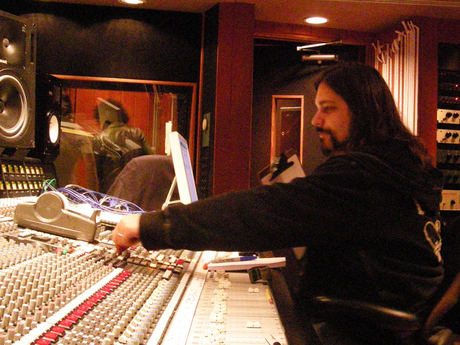

And to think, Nick Raskulinecz knows what all of those bells and whistles can do! © Nick Raskulinecz
Nick Raskulinecz is agitated. The normally affable producer, who has been nominated for 16 Grammy Awards (he won three of them) and whose work with bands such as the Foo Fighters, Rush, Alice In Chains, just to name a few, has made him one of the most successful shapers of rock during the past decade, is lamenting the state of the music business, and he doesn't hold back. "Things are terrible right now," he says.
Taking a break from some fall yard work at his house just outside of Nashville, where he lives with his wife, Amber, and their growing family (Sophia, 5; Waylon, 2; and a newborn girl, Evelyn), Raskulinecz sets down a chainsaw ("a totally therapeutic piece of machinery like no other") and expounds on his initial statement: "I'm not kidding, it stinks for people who want to make music," he says. "All the success I've been having, I thought everything would be different. I guess it's just an example of the whole industry crashing around us."
He catches himself, hearing his own words. "Hey, look, don't get me wrong, I'm doing OK - better than most guys who do what I do. But things are slow. All the rock producers are saying the same thing: the phone isn't ringing like it should, and when it does, the budgets they're given are terrible. I think it's simply reflective of the state of the business and what file-sharing sites have done to music. Bottom line is, it sucks."
Even so, Raskulinecz admits he's living something of a rock 'n' roll Cinderella story that he never quite imagined was possible. A music-obsessed teenager from Knoxville, Tennessee, he played bass in a variety of local bands and used the college fund money that his grandfather had started for him to buy an eight-track recorder. "It actually went over big," he says, his demeanor brightening. "My family was very supportive of me, even back then, when the craziest thing you could do was not go to college. But I had a dream and a vision, and they were right there with me. I was very fortunate."
That dream and vision would change over the years and eventually lead to a life-altering meeting with Dave Grohl in a Los Angeles parking lot. During the following interview with MusicRadar, Nick Raskulinecz discusses his trajectory from struggling bassist to struggling studio lackey to mega producer. In addition, he elucidates his theories on how to work successfully with superstars ("total honesty, always!") and offers more candid thoughts on the music industry.
Originally, you didn't plan on becoming a record producer. You wanted to be a rock star, right?
Get the MusicRadar Newsletter
Want all the hottest music and gear news, reviews, deals, features and more, direct to your inbox? Sign up here.
"Absolutely. I got the eight-track to record my own band and to hear our songs. But what happened was, I started recording other bands as well. I got to know what sounded good. Also, I started to become very aware of tunings, arrangements, mic placements, phase…You can go to school to learn those things, but there's no substitute for experimenting and just doing it."
After a few years, though, you moved to California.
"That's right. The whole time I was doing all of that recording, I was playing bass in a band called Hypertribe. It kind of ran its course in the Knoxville area, so I booked us a tour out in California. I think we were out in LA for two weeks, and while we were there, I could just feel the energy in the air. All the bands I listened to were working there. It was a very exciting time.
"Everything was so different than it is now. Bands were getting signed right and left, and they even got a bit of a chance to make it. 'Oh, you didn't happen on the first record? Go make another one, let's see if that one does something.' Labels gave you more than one shot back then. The record business was still cool."
At this point, there was no going back to Knoxville.

For Rasculinecz, sitting in a basement in Virginia with Dave Grohl was "heaven." © Rainer Jensen/dpa/Corbis
"Nope. We pooled our money, found a two-bedroom place, a practice room and stayed out there. It was evident pretty quickly that we got absorbed into the scene, the whole Monday night showcase deal. That happens to thousands of bands. But that's how it works, you know? You have to believe that you're going to make it; otherwise, why do it?
"While the band was trying to get known, a friend of mine, Brian Bell from Weezer, called me - I'd known him from Knoxville; he was one of the guys who'd hit the big time - and he said, 'Hey, this studio, Sound City, is looking for a runner. Are you interested?' A runner is basically what it sounds like: you run errands, fetch coffee, do all those things. But you also get a chance to hang around sessions and learn a lot. So, of course, I said, 'Hell yeah, I'm interested!' I went to the interview, got hired, and immediately a whole new world opened up for me. I learned what recording was really all about.
"Very quickly, however, I realized that Hypertribe didn't have a chance. I saw the bands that were making it, and I sensed that we just weren't cut from the same cloth. It was hard to come to grips with that, but on the other hand, it was a relief. A huge burden was lifted off my shoulders. I didn't want to depend on a bunch of other dudes for my destiny. At Sound City, I discovered my true calling, which was record production. So many bands were coming in there. They'd camp out for five, six, seven weeks. We'd bro down, man. I got to know how superstar bands operated.
"Around this time, I met real engineers and producers, and I started assisting on sessions with guys like Rick Rubin. It was such an eye-opening experience. I went from being a dude who could operate his own eight-track recorder to somebody who knew how to run a professional console. The learning curve was fast. But that's when I also learned how to make a record."
Now, when you say "make a record," what exactly do you mean? Because there's no one way to make a record…
"Of course. They're all different. What I mean is, I learned the difference between making a record and a demo. I learned how to properly mic drums and guitars, how to make them sound the way you want to hear them. All the things I used to read about in magazines became real to me. When I used to record my band and other groups on my eight-track in my mom's garage, I was just shooting in the dark. Working at Sound City gave me the real chops I needed. I learned gear, sure, but more importantly, I also saw how artists like to work, how they responded to producers. I got a sense of how their creative minds clicked."
Talk to me about meeting Dave Grohl at Sound City. How did you eventually become the producer for the Foo Fighters?
"My working with Dave and the Foo Fighters and everything else that has happened since really comes down to being in the right time at the right place. I was at the studio to pick up my paycheck, and Dave rolled up, literally in his tour bus, to record a song for the Godzilla soundtrack. The engineer who was supposed to be working that day wasn't there, so I said, 'Hey, I'd be glad to record you, Dave.' Which, of course, was no joke! [laughs] We got on great, had a lot of laughs, and I think he was very pleased with my work.
"Dave and I kept in touch for a couple of years after that. I had quit Sound City and was trying to make a go of it as a producer. Times were tough. I was just about to start working on a record by this band called Superdrag when, as luck would have it, I ran into Dave in the parking lot of this rehearsal studio called Mates. The whole thing was so random, but again, right place, right time.
"Dave was just about to start recording One By One, and he wanted to do it in the basement of his house in Virginia. I guess he was having a hard time finding a guy who would commit to sitting in his basement for four months, but to me it sounded like heaven. So he asked me if I'd be interested, and I said, 'Whatever you need, Dave.' Two weeks later, I'm in his basement in Virginia, putting a studio together. And we proceeded to make One By One."
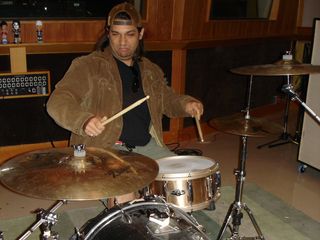
"Toms? You don't need no stinkin' toms!" Raskulinecz shows Dave Grohl and Taylor Hawkins how it's done. © Nick Raskulinecz
So, in the span of a few years, you went from being an assistant engineer to a producer barely getting by to working with Dave Grohl and the Foo Fighters. You go from making coffee runs to telling one of the biggest bands around what to do.
[laughs] "More or less. But see, it all came down to confidence. I knew what making records took; I just needed somebody to give me the shot. I think Dave liked my energy and enthusiasm. He could tell I was a fan, not one of these 'professional producers' who didn't really love music anymore. Passion breeds passion. Whatever he needed, I found a way to make it happen.
"Also, Dave's a guy who loves to have fun, and I'm the same way. We definitely bonded. We'd go to the sporting goods store to buy sleeping bags to hang on the walls for soundproofing. Not many pro producers would do that - they'd send their assistant out. To me and Dave, though, that was part of the adventure. We had a blast."
But what about when you had to push Dave or challenge him? Were you able to get in his face and say, "I don't think that sounds good"?
"To some extent I did. It happened more and more over time, as I got comfortable with my role and realized that he wanted honesty. In Your Honor was a record where I challenged him quite a bit. But I've never been afraid to say what I think, even with a band like Rush. That's what bands want. Dave would look me right in the face and say, 'What do you think?' And sometimes I'd have to tell him, 'I don't think it's good.' And once you say that, you can't backtrack. If you don't think it's good, you have to stick to your guns."
Working with Dave and Taylor Hawkins, was there ever any weirdness in the studio? Even though Taylor is a fantastic player, Dave could play all the drum parts if he wanted to.
"No, Dave lets Taylor own the tunes. Sure, Dave could play all the drum parts if he wanted to, and he certainly has specific ideas about how they should sound and how parts should be played, but he trusts Taylor to do his thing. And let me tell you, Taylor Hawkins is brilliant. He's a great drummer and a total musician. He's sitting behind the drum seat in the Foo Fighters for a reason, and Dave knows it. There was never one song where Dave said, 'Let me redo that, Taylor' or 'I don't think you got it, let me do it instead.' He really respects Taylor."
Is Dave very meticulous in the studio, or is he more the freewheeling sort?
"He's pretty freewheeling, very vibey. But it changes: One By One was very loose, whereas In Your Honor was more planned out. Dave was more meticulous on that one. But he doesn't like to hammer a song to death and take all the energy out of it. He knows it's rock 'n' roll, and it's gotta sound like the band is playing a song for the first time."
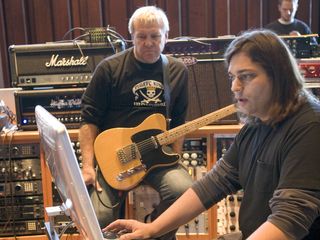
While they work, Raskulinecz tells Alex Lifeson how 2112 changed his life for the 43rd time. © Nick Raskulinecz
Let's talk about Rush. How did you come to work with them on the Snakes & Arrows album?
"Actually, it was thanks to the Internet. I was cruising around online and saw that Rush were getting ready to make a new record. No producer was named, so I called my manager and asked him to throw my hat in the ring. He sent them a press kit and some samples of my work. I was taking a total chance, to be quite honest, because I thought, No way will Rush even listen to my stuff, let alone call me.
"A few days later, I got a call from my manager, and he told me they were already working with somebody else. They loved my reel, which knocked me out - 'Rush loves my reel? Amazing!' [laughs] - but they were already deep into things. So I thought, OK, maybe next time. At least they know of me, you know? [laughs]
"Two months later, though, my manager called to tell me that things went south between Rush and the other producer, and they wanted to meet with me. I was out shopping with my wife when I got the call, and I was completely floored. [laughs] You have to understand, they're one of my favorite all-time bands in the world. I am a Rush head big-time!
"I flew up to meet them the next day, on my own dime, and I met Geddy and Alex at Geddy's house. We spent hours talking about…life! I don't think we even mentioned the word 'music' until a couple of hours into our meeting. They asked me tons of questions; they were really checking me out, what kind of person I was. Then I went down to Geddy's basement to hear some of the stuff they had been working on. After six or seven songs, they asked me what I thought, and I was as honest as I could be about anything. I said, 'I think this song is great, but the first chorus is too long. I think the drums could do something different here. Al, why don't you try this here?'
"I must have passed the test, because the next day I met with Neil. Again, we didn't speak about Rush at first. We talked Shakespeare, hiking, poetry, all kinds of things. It wasn't until the very end that we talked about drums."
When you talk to Neil Peart, one of the greatest drummers of all time, what do you say to him about drums?
"Dude, I love your shit!" [laughs]
Because I've read that what he was looking for on that record was somebody to "kick his ass." How do you kick Neil Peart's ass?
"Get him to play with ferocity. Get him to be not quite as prepared and be open to spontaneity. Get him out of his comfort zone and play by the seat of his pants a little more. I think he really liked that. He wanted to break away, but a lot of people are too afraid to speak up and say, 'Hey, your playing is too structured. Let go, man!' See, I'll walk out of the control room and stand right at the drums and cue fills. You gotta do that, or else you're really not serving the artist.
"I come at them as a producer but also as a fan. I told them, 'I want to hear Rush explode! Alex, I want to hear some monster riffs. Geddy, I wanna hear you sing your ass off.' And that's what they wanted."
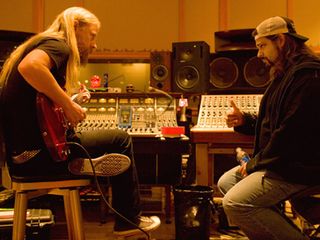
If he weren't holding a water bottle, Nick would be giving Jerry Cantrell two thumbs up! © Nick Raskulinecz
"Most bands, if they really want to make a great record, they don't want to be coddled. They want somebody to kick them in the butt. They want honesty. Dave Grohl, Rush, Alice In Chains - they want somebody to tell them when something's working, and if it isn't, what needs fixing?"
Obviously, Rush like what you do - you're working with them again on the upcoming Clockwork Angels. I've heard the first two tracks, Caravan and BU2B. Are they an indication of what we can expect on the rest of the record?
"Yep. There's going to be a lot of cool stuff. We've got six other songs ready to record, and they're probably going to want to write some more when they finish this tour. We'll sit down and figure out how to record everything else. I can already tell you that the title track is going to be one of the coolest things they've ever done. It's going to be epic.
"I told them, 'Don't try to write a single. Don't try to do anything conventional. Give me Rush from back in the day.' They don't need to write something for the sake of radio play. They're Rush! [laughs] So I think the record is going to be a little more bare bones, a little less produced. It's going to be more direct, with killer riffs, solos, pounding drums and Geddy singing up high the way he should. That, to me, is the sound of Rush."
Let's talk about your recent work with Alice In Chains. That was a pretty serious undertaking, I imagine.
"It was a big project. It took a lot of energy to get through that one. In many ways, it was a new band, and there were a lot of unknowns. Would people respond to what they were doing? Would the band still be relevant? A new singer filling Layne Staley's shoes? That's a big deal. And I was a little apprehensive myself, because I loved the Alice In Chains from back in the day. Would this be a Jerry Cantrell solo record with a different singer, or would this be Alice In Chains?
"So I met with Jerry and the new guy, William DuVall, and we hung out. They asked me tons of questions. But it came down to the songs. They played me what they had, and I was blown away. Immediately, I could tell they were a band. They were Alice In Chains. After I heard Check My Brain, I looked at Jerry and said, 'Dude, I'm in. When do you want to start?'" [laughs]
On that record you got to work with a true rock legend, Sir Elton John, who played piano on the title track, Black Gives Way To Blue.
"That was one of the last things we did. It was heart wrenching, man. That was Jerry saying goodbye to Layne. When Jerry was singing it, you could hear a pin drop. A couple of the guys had to leave the studio - it was too much for them. I was literally sitting at the board with tears coming out of my eyes, weeping about a guy I had never even met. It was hardcore.
"The whole thing with Elton John happened because Jerry had written him a very heartfelt letter. He told Elton how much he meant to him and Layne and what the track was about. He said that the song needed something else...piano. A few weeks went by, and we didn't hear anything. Then one day we got a phone call: 'Elton will do it, but he can only do it in Vegas, and he has a window from, like 2 to 4.' So we flew to Vegas - of course!" [laughs]
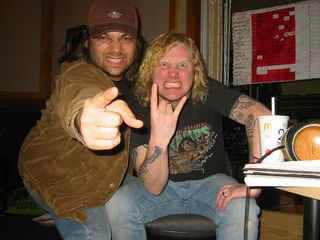
Nick and Stone Sour's Corey Taylor after a few Happy Meals. © Nick Raskulinecz
"We go to the studio, and Elton John walks in. I couldn't believe it - there's Elton John! I mean, I grew up on him, and there he was, ready to play on a track I was producing. I had goosebumps. So we listened to the song with Elton, and then he played a take. His first pass…well, he was playing, but he was playing hard. Too hard. And I'm sitting there thinking, Oh my God, how am I going to tell Elton John that he's overplaying?
"Well, I got my courage up and turned on the talkback mic and said, 'Hey Elton, that's great, but it's a little too much.' And he was cool and said, 'No problem. Let me do it again.' And he played another take that was awesome! But see, it all goes back to what I was originally saying: You can't be afraid to tell these guys the truth. They want to give you their best. Even Elton John. I had to tell him that what he did wasn't right, and he was fine with the criticism. He did it again, and it was exactly what the song needed. [laughs] I hear myself talking about it, and it sounds so unreal. Telling Elton John to redo his piano was pretty heavy, but it's what I had to do."
You've also produced the past two albums for Stone Sour, Come What(ever) May and their most recent record, Audio Secrecy. How are Corey Taylor and Jim Root in the studio?
"Man, those guys are the best. Talk about two guys with such passion and diversity. Corey really gets a chance to open up and show what an amazing singer he is in Stone Sour - I think he likes to get away from the chaos that Slipknot can be sometimes. And Jim, he's such a versatile guitarist. That the two of them can just switch gears like that and go from total metal mayhem in Slipknot to, you know, some of the softer, more personal-type songs in Stone Sour…I just can't say enough about them. Great guys."
Where were you in finishing Audio Secrecy when you got the news that Paul Gray from Slipknot had died?
"We were mixing. [sighs] Yeah, that really put a dark shadow on things. The guys were quite shaken, as you can imagine. They tried to keep their minds on work as best they could, but every hour they were dealing with people asking them, 'Is this the end of Slipknot?' Not a very easy time."
What kind of advice would you give to all the budding producers out there? There's been so many changes to the business, even since you started.
"There sure have been, and the changes haven't been good. Honestly, my advice would be to do something else. [laughs] I'm not even kidding. It's so hard to get your music made. Not really that, no, it's easy to make music, but that doesn't mean you're going to make great music. The business almost doesn't allow for that anymore; it squashes creativity.
"I mean, look at me: I'm more successful than I've ever dreamed I would be. But I still have a hard time finding work. I know a lot of guys wouldn't tell you that, but I don't pull punches. There isn't a lot going on, and I put a lot of the blame on the Internet and illegal downloading. And listen, they call it 'illegal downloading' for a reason, because it's just that: illegal. It really hurts bands, producers; it hurts people across the board."
Recently, I spoke with Bryan Adams - on the day that LimeWire was shut down, oddly enough - and he was also very vocal about file-sharing. He called it "disgraceful."
"And he' s right. It is disgraceful! I know people think that you should get everything free now with the Internet, but people have to realize that artists are trying to make a living from their music. The downloading has marginalized everybody and everything, from artists to producers to guys who drive the trucks to bring the CDs to the stores. Everybody in the music business has been affected. I don't know if things can ever go back to the way they used to be - I know they can't; in fact, they'll probably get worse - but wouldn't it be great if we could just have those record stores again? I think that would be fantastic!"
Liked this? Now read Alex Lifeson on steampunk, solos and Moving Pictures
Connect with MusicRadar: via Twitter, Facebook and YouTube
Get MusicRadar straight to your inbox: Sign up for the free weekly newsletter
Joe is a freelance journalist who has, over the past few decades, interviewed hundreds of guitarists for Guitar World, Guitar Player, MusicRadar and Classic Rock. He is also a former editor of Guitar World, contributing writer for Guitar Aficionado and VP of A&R for Island Records. He’s an enthusiastic guitarist, but he’s nowhere near the likes of the people he interviews. Surprisingly, his skills are more suited to the drums. If you need a drummer for your Beatles tribute band, look him up.
Most Popular







